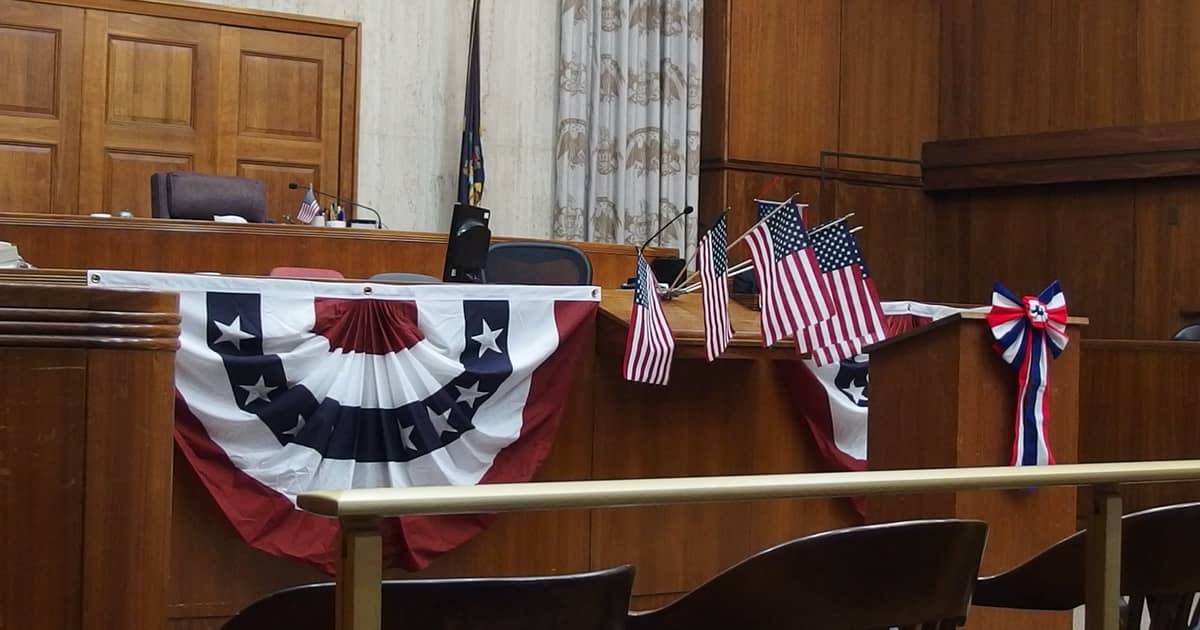The Lebanon County Court of Common Pleas and all six Lebanon County magisterial district courts will reopen to the public Monday, June 1, with restrictions designed to discourage the spread of the novel coronavirus.
Lebanon County Court Administrator Stephanie Axarlis made the announcement via email on Friday, May 29 after Pennsylvania’s Supreme Court, which supervises all courts throughout the commonwealth, announced that the statewide judicial emergency would not extend into June. The statewide judicial emergency was first declared on March 18 in response to the COVID-19 pandemic.
With limited exceptions, local courts have been closed to the public and have not conducted in-person hearings and trials since then.
The modified resumption of court operations follows the county’s recent move to “yellow” status under Governor Wolf’s three-tiered plan COVID-19 reopening plan.
Read More: Lebanon County is now officially in the “yellow phase” of state reopening plan
The statewide judicial emergency applied to the courts of common pleas, which handle criminal prosecutions and civil matters including family law cases, and to the magisterial district courts, which handle traffic offenses, preliminary criminal matters, small civil lawsuits, and landlord-tenant actions.
Local courts won’t be completely returning to their pre-COVID routines today. Subject to state and federal constitutional requirements, courts can still limit in-person access and proceedings, and allow the use of “advanced communication technologies” – video conferences – and electronic document filing in situations that court rules normally prohibit.
According to Axarlis, all persons entering the municipal building, where common pleas courtrooms are located, and magisterial district court offices throughout the county, will be met by sheriff’s deputies who will ensure that all requirements, including wearing a mask, are being followed.
Axarlis added that “the only public access will be at the rear of the building adjacent to the main parking lot of the municipal building.”
Lebanon County Sheriff Bruce Klingler said in a Friday phone call that deputies will be stationed in hallways outside municipal building courtrooms, and at magisterial district courts, to remind members of the public of mask and social distancing requirements.
Deputies have been manning municipal building entrances since the COVID-19 lockdown began in March, and are always present in courtrooms when common pleas court is in session.
Axarlis said that modified court procedures will include staggered start times to limit the number of people in the municipal building at any time, use of conference rooms close to courtrooms for those waiting, not letting the public into the building until 15 minutes ahead of scheduled start times, physical seating arrangements in courtrooms to assure distancing, and hand sanitizer and disinfectant wipes in the courtrooms.
Criminal jury trials, which have been halted since March, will resume during the week of June 15, using the largest two of the building’s four courtrooms.
Trials, civil and criminal, with and without juries, have completely stopped since March, resulting in backlogs, especially in criminal cases.
For now, local courts can continue to suspend speedy trial rules for criminal defendants. The state and federal constitutions guarantee prompt criminal trials, but set no time deadlines. Pennsylvania criminal rules, however, require trials to start within specified times after charges are filed, depending on a number of factors.
Axarlis said that potential jurors will be kept in several rooms while waiting to be selected, instead of the single large jury assembly room that is traditionally used. Normally, over 100 potential jurors are summoned to the municipal building for monthly trial terms.
She added that “jurors will not be seated in the jury box in either of these courtrooms but will be seated in a portion of the gallery. Other precautions implemented include, relocation of the witness stand to allow for social distancing. Spectators and witnesses will be directed to specific areas of the courtroom.”
The Supreme Court’s March order had closed all Pennsylvania courts to the public and eliminated in-person proceedings for all but a small list of “essential functions,” which included hearings to decide whether an accused should be imprisoned or detained, temporary protection from abuse hearings, emergency child custody and guardianship hearings, mental health reviews, and certain public health matters.
Since then, video hearings have been widely used for court proceedings considered non-essential
In her email, Axarlis said that document filing and inspection will continue to be limited. “Filing offices are requesting that appointments be made to file papers in person, but will continue to accept filings via mail, email and fax.”
Lebanon County has limited electronic filing capabilities, and generally more limited online access to court documents and public records than neighboring counties.
Read all of LebTown’s COVID-19 coverage here.
Is there a story you think LebTown should report? Let our newsroom know using the form below.
Help us provide journalism Lebanon County needs.
If you are thankful for LebTown, consider joining as a member. Members get an inside look at our publishing schedule each week, plus invites to a members-only Facebook group and happy hours.
Learn more and join now here.
Subscribe to our newsletter for updates each weekday at 3 p.m.
























